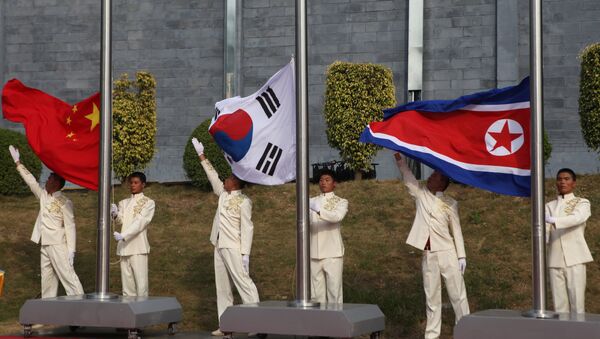David O'Brien: The main reason for this visit was to brief the Korean Workers’ Party on the outcome of the very important National Party Congress held in Beijing. And, of course, the Workers’ Party of North Korea and the Communist Party of China are ideological brothers, but it’s very much a big brother-little brother relationship. Having said that, relations between the two have never been as bad as they are.
China sees itself as being surrounded by countries, which are not particularly friendly to it, indeed. It sees North Korea perhaps as its only real ally in the region. But generally speaking, China does not have particularly good relations with its neighbors. This may signify a step off from China in an attempt to deal with the situation, which is at the moment, probably, one of their major concerns.
This is the first visit of China to North Korea in two years now. Do you think there is there any link to the fact that Donald trump has just visited the Far East?
David O'Brien: Well, certainly, and Donald Trump has just been to China and he came back with very warm views of the Chinese. He regards his visit as having been a great success, and Donald Trump, despite his rather bellicose language towards North Korea, has stated on a number of occasions that he’s willing to talk to Kim-jong-un. He sees himself as a great deal-maker and perhaps a deal is on the card.
How successful could this visit be in trying to establish dialogue with Pyongyang regarding a nuclear disarmament deal?
Certainly all the news coming out of North Korea recently has been negative. There may be some indication that this is an attempt by the Chinese to kick-start negotiations, because it really is in China’s best interest to stabilize the situation, literally the last thing China wants is conflict on the Korean Peninsula. They don’t want to see Kim removed and they certainly don’t want see millions of refugees being displaced in the conflict into their northern region.
The meeting of the two leaders, Xi Jinping and Moon Jae In, do you think it could signify a slight turn of tide in the ongoing relations with those two countries? Would that then bring the situation with regard to the peninsula in relations improving with both countries?
David O'Brien: Certainly – Xi Jinping has adopted a more forceful position internationally and certainly in his own neighborhood; and Xi Jinping has really emphasized a strong China, a rejuvenated China taking a leadership position in its own neighborhood and also internationally. And also, that has contributed to tensions among China’s nearest neighbors. Japan-China relations are not particularly good, and Chinese relations are not as good as they were with some of their other neighbors. On the other hand, South Korea is very keen, and the new president of South Korea is very keen on reaching out, perhaps, to the North Koreans: the Sunshine Policy of a number of years ago was an attempt to bring some kind of definitive conclusion to the war, which is still technically ongoing.
Can Xi Jinping change the relationship with South Korea? […] While the rhetoric on both sides is always quite hot, the actual negotiations are probably taking place at all times, but should something happen unexpectedly either from the United States, which is far more uncertain as to how it’s going to react, from Kim Jung-un or from another situation in North Korea – but I think generally speaking, this does give an indication that Beijing is trying to bring this to some kind of advancement.
There were reports that Beijing has imposed official sanctions against Seoul in retaliation to THAAD deployment in the South, which prompted Seoul to agree not to be involved in military alliance with the US and Japan in return for the lifting of sanctions. What do you make of this development? Could this change the situation on the peninsula from your perspective?
David O'Brien: The situation on the Korean Peninsula is always finely balanced, and certainly China does perceive South Korea as being very closely allied with the United States, and it sees that as a potential serious threat when Korea and the United States engage in military exercises. China perceives that as a threat. When these things happen constantly there is a kind of a dance to perform. […] These are regular events and China tends to react in particular way each time. It’s not so much the reaction, it’s the scale of the reaction that can be most telling. If it’s a particularly angry reaction, then it might indicate something. This is probably somewhere in the middle, not being a low reaction or a major reaction, but it does and certainly will impact the peninsula, like all of these events.


